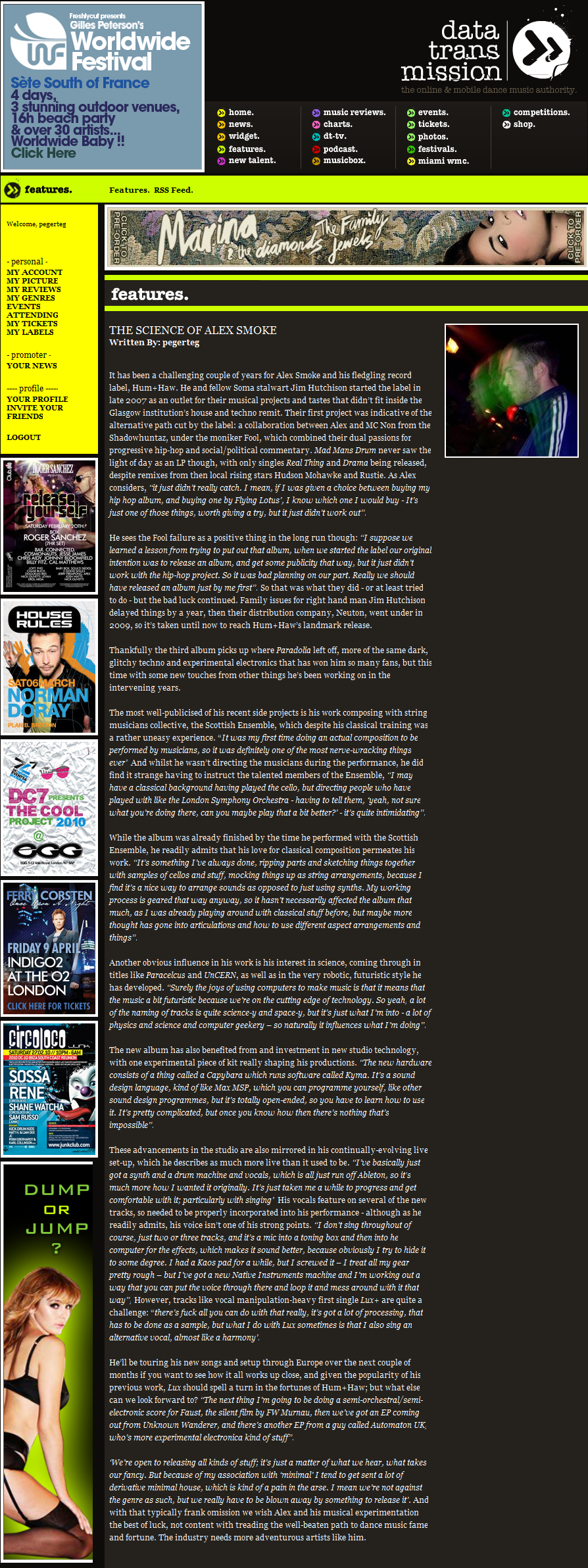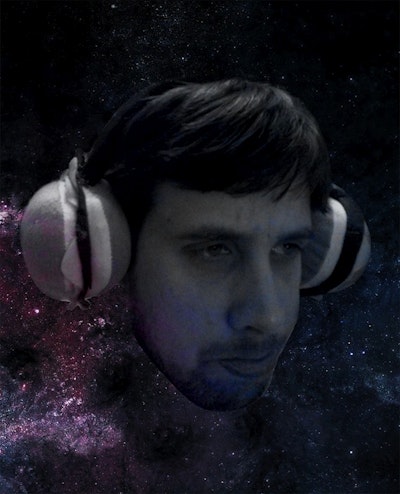The Science of Alex Smoke
Data Transmission

It has been a challenging couple of years for Alex Smoke and his fledgling record label, Hum+Haw.
He and fellow Soma stalwart, Jim Hutchison, started the label in late 2007 as an outlet for their musical projects and tastes that didn’t fit inside the Glasgow institution’s house and techno remit. Their first project was indicative of the alternative path cut by the label: a collaboration between Alex and MC Non from the Shadowhuntaz, under the moniker Fool, which combined their dual passions for progressive hip hop and social/political commentary. ‘Mad Mans Drum’ never saw the light of day as an LP though, with only singles ‘Real Thing’ and ‘Drama’ being released, despite remixes from then local rising stars Hudson Mohawke and Rustie. As Alex considers, ‘it just didn’t really catch. I mean, if I was given a choice between buying my hip hop album, and buying one by Flying Lotus’, I know which one I would buy - It’s just one of those things, worth giving a try, but it just didn’t work out’.
He sees the Fool failure as a positive thing in the long run though, ‘I suppose we learned a lesson from trying to put out that album, when we started the label our original intention was to release an album, and get some publicity that way, but it just didn’t work with the hip hop project. So it was bad planning on our part, really we should have released an album just by me first’.
So that was what they did, or at least tried to do, but the bad luck continued: family issues for right hand man Jim Hutchison delayed things by a year, then their distribution company, Neuton, went under in 2009, so it’s taken until now to reach Hum+Haw’s landmark release.
Thankfully the third album picks up where Paradolia left off, more of the same dark, glitchy techno and experimental electronics that has won him so many fans; but this time with some new touches from other things he’s been working on in the intervening years.
The most well publicised of his recent side projects is his work composing with string musicians collective, the Scottish Ensemble. Which, despite his classical training, was rather uneasy experience, ‘it was my first time doing an actual composition to be performed by musicians, so it was definitely one of the most nerve-wracking things ever’ And whilst he wasn’t directing the musicians during the performance, he did find it strange having to instruct the talented members of the Ensemble, ‘I may have a classical background having played the cello, but directing people who have played with like the London Symphony Orchestra - having to tell them, ‘yeah, not sure what you’re doing there, can you maybe play that a bit better?’ - it’s quite intimidating’.
While the album was already finished by the time he performed with the Scottish Ensemble, he readily admits that his love for classical composition permeates his work. ‘It’s something I’ve always done, ripping parts and sketching things together with samples of cello’s and stuff, mocking things up as string arrangements, because I find it’s a nice way to arrange sounds as opposed to just using synths. My working process is geared that way anyway, so it hasn’t necessarily affected the album that much, as I was already playing around with classical stuff before, but maybe more thought has gone into articulations and how to use different aspect arrangements and things’.
Another obvious influence in his work is his interest in science, coming through in titles like Paracelcus and UnCERN, as well as in the very robotic, futuristic style he has developed. ‘Surely the joys of using computers to make music is that it means that the music a bit futuristic because we’re on the cutting edge of technology. So yeah, a lot of the naming of tracks is quite science-y and space-y, but it’s just what I’m into - a lot of physics and science and computer geekery – so naturally it influences what I’m doing’.
The new album has also benefited from and investment in new studio technology, with one experimental piece of kit really shaping his productions. ‘The new hardware consists of a thing called a Capybara which runs software called Kyma. It’s a sound design language, kind of like Max MSP, which you can programme yourself, like other sound design programmes, but it’s totally open ended, so you have to learn how to use it. It’s pretty complicated, but once you know how then there’s nothing that’s impossible’.
These advancements in the studio are also mirrored in his continually evolving live setup, which he describes as much more live than it used to be, ‘I’ve basically just got a synth and a drum machine and vocals, which is all just run off Ableton, so it’s much more how I wanted it originally, it’s just taken me a while to progress and get comfortable with it; particularly with singing’.
His vocals feature on several of the new tracks, so needed to be properly incorporated into his performance; although as he readily admits his voice isn’t one of his strong points. ‘I don’t sing throughout of course, just two or three tracks, and it’s a mic into a toning box and then into he computer for the effects, which makes it sound better, because obviously I try to hide it to some degree. I had a Kaos pad for a while, but I screwed it – I treat all my gear pretty rough – but I’ve got a new Native Instruments machine and I’m working out a way that you can put the voice through there and loop it and mess around with it that way’, however tracks like vocal manipulation-heavy first single Lux+ are quite a challenge, ‘there’s fuck all you can do with that really, its got a lot of processing, that has to be done as a sample, but what I do with Lux sometimes is that I also sing an alternative vocal, almost like a harmony’.
He’ll be touring his new songs and setup through Europe over the next couple of months, if you want to see how it all works up close, and given the popularity of his previous work, Lux should spell a turn in the fortunes of Hum+Haw; but what else can we look forward to?
‘The next thing I’m going to be doing a semi-orchestral/semi-electronic score for Faust, the silent film by FW Murnau, then we’ve got an EP coming out from Unknown Wanderer, and there’s another EP from a guy called Automaton UK, who’s more experimental electronica kind of stuff’.
‘We’re open to releasing all kinds of stuff; it’s just a matter of what we hear, what takes our fancy. But because of my association with ‘minimal’ I tend to get sent a lot of derivative minimal house, which is kind of a pain in the arse. I mean we’re not against the genre as such, but we really have to be blown away by something to release it’.
And with that typically frank omission we wish Alex and his musical experimentation the best of luck - not content with treading the well beaten path to dance music fame and fortune, the industry needs more adventurous artists like him.
